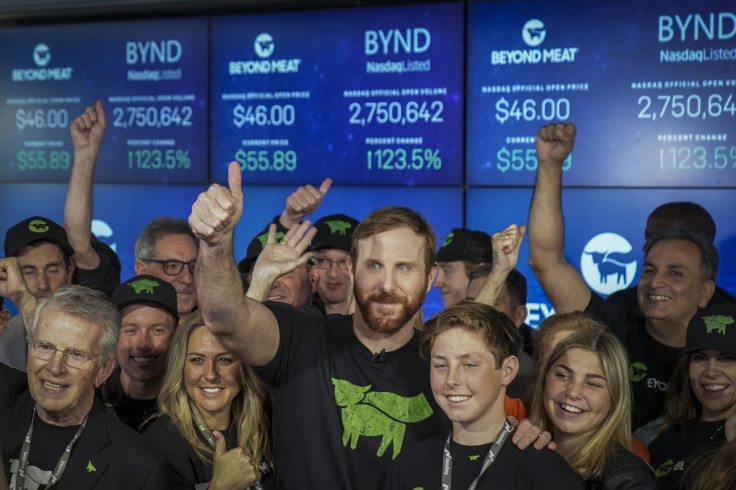'Fake' Meat: Everything To Know About Beyond Meat's Plant-Based Product

Beyond Meat, a company created by vegan Ethan Brown in 2009, makes and sells plant-based protein which can usually be bought at Whole Foods. With more and more people looking for better-tasting alternatives to meat as a way to reduce their environmental footprints or change up their diet, vegan products like Beyond Meat offer just that.
The product is designed to mimic the taste and feel of real meat to the point that people cannot distinguish whether or not it is the real thing. With Beyond Meat making waves in the stock market and among consumers, here are some things you should know about the plant-based alternative to meat.
Thrilled to announce that today we became the 1st plant-based food company to go public on a major exchange.
— Beyond Meat (@BeyondMeat) May 2, 2019
Through success and struggles, the consumer has been there for us, offering feedback, love, and inspiration. Today, together, we are breaking new ground. #GoBeyond pic.twitter.com/0RCJyXkrrL
What is it made of?
Beyond Meat bills itself the world’s first plant-based burger sold in the meat case of U.S. grocery stores. But interviews with nine U.S. grocery chains show that retailers are still figuring out Beyond Meat’s best fit in their shopping aisles: https://t.co/BNjI8jaXIl pic.twitter.com/8ogXl0I9K4
— Reuters (@Reuters) June 6, 2019
Beyond Meat uses substitutes to mimic the taste and feel of real meat. These vegan meat substitutes are made from a mixture of rice protein, pea protein isolates, canola oil, mung bean protein and other ingredients like apple extract, pomegranate powder, sunflower lecithin, potato starch and the like. The plant-based protein is also packed with a range of vitamins and minerals to ensure that consumers are getting the nutrition they need.
These ingredients are then mixed and fed into a food extrusion machine that cooks the mixture and forces it through a specially designed method that involves pressure, steam and cold water to give the meat alternative its chicken-like texture. The main ingredient in the faux meat is pea protein, which is extracted from yellow peas. The company outsources this ingredient from Canada and France.
Does it taste like real meat?
"I didn't tell anybody I made sliders out of the Beyond Burger and nobody could tell the difference." - @alroker https://t.co/Qe7xq1WQ9B
— Beyond Meat (@BeyondMeat) June 11, 2019
While taste is subjective, many have claimed that the product tasted like chicken when it first came out. However, the company has since updated its recipe in an attempt to make the product taste more like real meat and it seems to have worked.
Are they healthier?
We'll just leave this right here. You're welcome 😉
— Beyond Meat (@BeyondMeat) June 8, 2019
Full recipe ➡️ https://t.co/R3QSr6C0uk pic.twitter.com/uogufMFYo6
As with other questions about diet, it depends. Beyond Meat’s products can be nutritionally similar to real beef, but seeing as meat can be prepared in a number of ways, questions about whether or not Beyond Meat is healthier are hard to answer.
Beyond Meat’s 4-ounce patty is listed at 270 calories, while a similarly sized patty has around 290 calories and the only variation is in the nutrients each contains. While at face value, the faux meat may seem healthier, it still depends on how you prepare it.
© Copyright IBTimes 2025. All rights reserved.





















